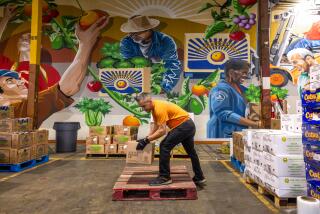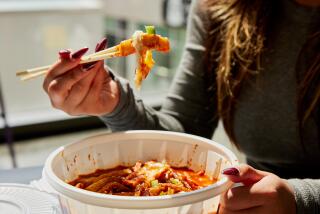Feeding the Hungry of Two Nations, Simultaneously
- Share via
It’s Wednesday evening inside a Seventh-day Adventist Church in Hollywood, and about 130 hungry men and women are looking forward to dinner--for some, their first hot meal in days.
Many are street people traveling with bundles. Others have a place to stay, but augment their government checks by finding a free meal whenever they can.
You would not know by looking, but on this evening, Hollywood’s down and out are intertwined with North Korea’s starving people through an ingenious project called Double Cropping.
Volunteers in the feeding program earn money by finding sponsors to pledge financial support to Double Cropping based on their volunteer hours. That money is channeled through the American Friends Service Committee, the Philadelphia-based Quaker organization that has been delivering emergency food aid and supplies in North Korea.
The program takes its name from the image of simultaneously reaping two crops.
“It’s not practical for us [as Americans] to go directly to give food to North Koreans,” said Frank Tamborello, one of 40 or so volunteers who since Thanksgiving have worked at food pantries, food banks and other establishments feeding the poor to help starving people in North Korea. “But we can volunteer our time here and then collect money to attack the problem there. These days hunger and bad economic conditions in one country . . . spill over the borders.”
*
Five years of severe food shortages have caused devastating malnutrition in North Korea. Experts say at least 1 million--possibly as many as 3 million--have died prematurely. A new study by international aid organizations reports that 62% of children under 7 suffer from stunted growth--meaning a generation of North Koreans are likely to be mentally and physically impaired because of the long-standing malnutrition.
Their plight makes Double Cropping volunteer Na-Young Song, a Korean American, cry.
“I’m Korean too,” said the Culver City High School senior, tears welling in her eyes. “Whenever I am spending money, I think of what I could do for them if I save it.”
The daily ration in the world’s most isolated nation of 23 million is now down to a half bowl of rice. Many have resorted to making noodles and cakes by mixing edible plants with indigestible fillers like cornstalks and straw, leading to rampant stomach troubles.
Volunteers said they are frustrated that the desperate condition of North Koreans is not getting widespread publicity and sympathy because of the country’s communist government.
“A real tragedy is occurring, but a lot of people don’t know about it because of political differences,” said Yong-bin Yuk, an organizer of the Los Angeles based Campaign to Stop Famine in north Korea, which administers Double Cropping.
Although North Korean officials trace their food shortage to a series of floods and droughts in the mid-1990s, it is also tied to the collapse of the Soviet Union, which had long been North Korea’s main supplier of food, fuel and fertilizer.
A mountainous country with barely 20% arable land, North Korea imported food for decades, not only from the Soviet Union but also China.
The United States and Soviet Union partitioned the Korean Peninsula following World War II. American policymakers, who drew the dividing line roughly in the middle of the country, paid no heed to the fact that the south was rich in farmland while the north was endowed with minerals and other resources. As one, the peninsula was self-sufficient; divided, it wasn’t.
*
Many people who have come to the Seventh-day Adventist Church of Hollywood to partake of the hot meal being served by Double Cropping volunteers don’t know much about North Korea or the famine.
But, once Ankine Aghassian, director of the church’s feeding program, explains, some nod in support.
“We could help each other--and learn from each other,” said one diner, Dusty Spencer, adding that volunteers should be commended for doing what they do.
As is often the case, volunteers said they’re blessed to be involved.
“This has been a profound educational experience,” said Jung-Eun Son, a Koreatown kindergarten teacher. The encounter with Los Angeles’ poor has broadened her world and done the same for fellow volunteers by giving them firsthand exposure to hunger at home, she said.
Since April 1997, the Campaign to End Famine in north Korea has raised more than $30,000, said Alyssa Kang, a key organizer.
“We are definitely making progress in changing peoples’ attitudes about North Korea,” organizer Yuk said.
Adds church director Aghassian: “This is a win-win situation. We get the volunteers we desperately need and they get the money to help North Koreans. We hope they’ll keep on coming back.”
More to Read
Sign up for Essential California
The most important California stories and recommendations in your inbox every morning.
You may occasionally receive promotional content from the Los Angeles Times.










